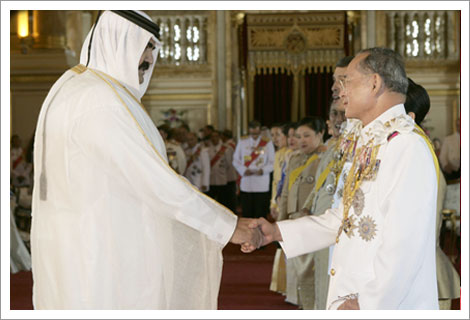 |
|||||||||
|
|||||||||
Qatar is keen on effectively participating in all issues and challenges that confront the gulf region. It further attaches great importance to supporting the march of the GCC. Qatar also exerts strenuous efforts to help achieve Arab solidarity and build channels of confidence and communication among Arab States. Qatar also underlines the importance of the peaceful settlement of disputes between states. At the international arena, Qatar supports the United Nations efforts and acts to exchange relations with all the peace-loving states and peoples.
H.H. Sheikh Hamad Bin Khalifa Al Thani, the Emir of the State of Qatar is a man of prolific contribution and high potential in enriching the political practice, regionally and internationally. Generally speaking, those contributions have greatly helped to further boost the economic and political cooperation between Qatar and the entire world. Since his accession to power in June 1995, visits by scores of influential international dignitaries to Doha as well as the tours that took him to almost all corners of the three old continents and the two Americas have been gaining Qatar a position of eminence among the nations of the world and qualifying it to play a positive and influential role based on a political vision marked with transparency, realism and moderation.
Qatar has gone a long way down the road of international interaction since the dawn of its independence in 1971. Its emergence as a modern state started with acquiring its independence and continued to see Qatar transform
H.H. Sheikh Hamad Bin Khalifa Al Thani, the Emir of the State of Qatar is a man of prolific contribution and high potential in enriching the political practice, regionally and internationally. Generally speaking, those contributions have greatly helped to further boost the economic and political cooperation between Qatar and the entire world. Since his accession to power in June 1995, visits by scores of influential international dignitaries to Doha as well as the tours that took him to almost all corners of the three old continents and the two Americas have been gaining Qatar a position of eminence among the nations of the world and qualifying it to play a positive and influential role based on a political vision marked with transparency, realism and moderation.
Qatar has gone a long way down the road of international interaction since the dawn of its independence in 1971. Its emergence as a modern state started with acquiring its independence and continued to see Qatar transform